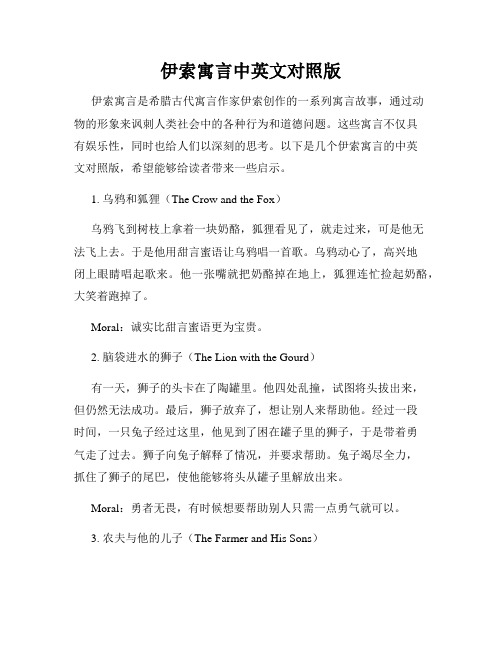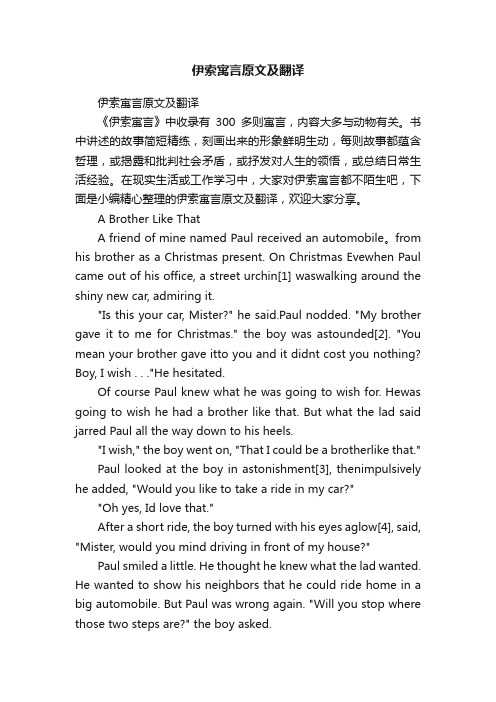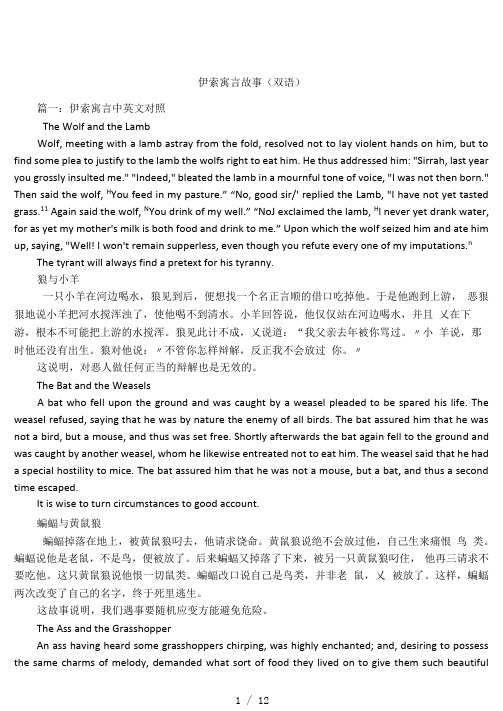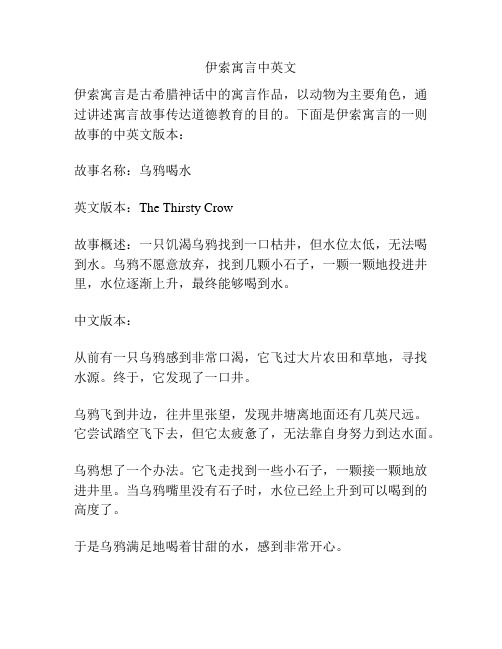伊索寓言中英翻译
伊索寓言中英文对照版

伊索寓言中英文对照版伊索寓言是希腊古代寓言作家伊索创作的一系列寓言故事,通过动物的形象来讽刺人类社会中的各种行为和道德问题。
这些寓言不仅具有娱乐性,同时也给人们以深刻的思考。
以下是几个伊索寓言的中英文对照版,希望能够给读者带来一些启示。
1. 乌鸦和狐狸(The Crow and the Fox)乌鸦飞到树枝上拿着一块奶酪,狐狸看见了,就走过来,可是他无法飞上去。
于是他用甜言蜜语让乌鸦唱一首歌。
乌鸦动心了,高兴地闭上眼睛唱起歌来。
他一张嘴就把奶酪掉在地上,狐狸连忙捡起奶酪,大笑着跑掉了。
Moral:诚实比甜言蜜语更为宝贵。
2. 脑袋进水的狮子(The Lion with the Gourd)有一天,狮子的头卡在了陶罐里。
他四处乱撞,试图将头拔出来,但仍然无法成功。
最后,狮子放弃了,想让别人来帮助他。
经过一段时间,一只兔子经过这里,他见到了困在罐子里的狮子,于是带着勇气走了过去。
狮子向兔子解释了情况,并要求帮助。
兔子竭尽全力,抓住了狮子的尾巴,使他能够将头从罐子里解放出来。
Moral:勇者无畏,有时候想要帮助别人只需一点勇气就可以。
3. 农夫与他的儿子(The Farmer and His Sons)一个农夫生病了,他将他的三个儿子召集在一起。
他给每个儿子一把麦梳,并要求他们尽力将麦梳折断。
三个儿子都使出全力,但都没有成功。
父亲把麦梳分开,然后给每个儿子一根棒子,儿子们很容易折断了这根棒子。
他解释说,只有团结在一起的时候,我们才会变得强大。
Moral:团结合作,能够使我们更加强大。
4. 狼和狼崽(The Wolf and His Young)一只大狼在树下结识了一只小狼,他对小狼说,他会教他如何获得食物和保护自己。
小狼非常高兴,跟随大狼学习。
在他们的旅途中,他们遇到了一群羊,大狼抓住了其中一只羊。
但等到小狼去抓住自己的羊时,他没有成功。
大狼生气地说:“你是我儿子,却连抓一只羊都不会?”小狼低下了头。
伊索寓言原文及翻译

伊索寓言原文及翻译伊索寓言原文及翻译《伊索寓言》中收录有300多则寓言,内容大多与动物有关。
书中讲述的故事简短精练,刻画出来的形象鲜明生动,每则故事都蕴含哲理,或揭露和批判社会矛盾,或抒发对人生的领悟,或总结日常生活经验。
在现实生活或工作学习中,大家对伊索寓言都不陌生吧,下面是小编精心整理的伊索寓言原文及翻译,欢迎大家分享。
A Brother Like ThatA friend of mine named Paul received an automobile。
from his brother as a Christmas present. On Christmas Evewhen Paul came out of his office, a street urchin[1] waswalking around the shiny new car, admiring it."Is this your car, Mister?" he said.Paul nodded. "My brother gave it to me for Christmas." the boy was astounded[2]. "You mean your brother gave itto you and it didnt cost you nothing? Boy, I wish . . ."He hesitated.Of course Paul knew what he was going to wish for. Hewas going to wish he had a brother like that. But what the lad said jarred Paul all the way down to his heels."I wish," the boy went on, "That I could be a brotherlike that."Paul looked at the boy in astonishment[3], thenimpulsively he added, "Would you like to take a ride in my car?""Oh yes, Id love that."After a short ride, the boy turned with his eyes aglow[4], said, "Mister, would you mind driving in front of my house?"Paul smiled a little. He thought he knew what the lad wanted. He wanted to show his neighbors that he could ride home in a big automobile. But Paul was wrong again. "Will you stop where those two steps are?" the boy asked.He ran up the steps. Then in a little while Paul heard him coming back, but he was not coming fast. He was carrying his little crippled[5] brother. He sat him down on the bottom step, then sort of squeezed up against him [6] and pointed to the car."there she is, Buddy[7], just like I told you upstairs. His brother gave it to him for Christmas and it didnt cost him a cent. And some day Im gonna give you one just like it . . . then you can see for yourself all the pretty things in the Christmas windows that Ive been trying to tell you about."Paul got out and lifted the lad to the front seat of his car. the shining-eyed older brother climbed in beside him and the three of them began a memorable holiday ride.That Christmas Eve, Paul learned what Jesus meant when he said: "It is more blessed to give[8] . . . "--Dan Clark注释:1、urchin:淘气鬼,顽童,尤其是指男孩子。
伊索寓言「中英双语」

伊索寓言「中英双语」伊索寓言3篇「中英双语」《伊索寓言》相传为公元前六世纪,被释放的古希腊奴隶伊索所著,搜集所有古希腊民间故事,并加入印度、阿拉伯及基督教故事。
下面是店铺分享的几篇伊索寓言,欢迎大家阅读!The Raven and the Swan乌鸦和天鹅A RAVEN saw a Swan and desired to secure for himself the samebeautiful plumage. Supposing that the Swan's splendid white color arose from his washing in the water in which he swam, theRaven left the altars in the neighborhood where he picked up hisliving, and took up residence in the lakes and pools. Butcleansing his feathers as often as he would, he could not changetheir color, while through want of food he perished.Change of habit cannot alter Nature.乌鸦非常羡慕天鹅洁白的羽毛。
他猜想天鹅一定是经常洗澡,羽毛才变得如此洁白无瑕。
于是,他毅然离开了他赖以生存的祭坛,来到江湖边。
他天天洗刷自己的羽毛,不但一点都没洗白,反而因缺少食物饥饿而死。
这故事是说,人的本性不会随着生活方式的改变而改变。
The Goat and the Goatherd 山羊与牧羊人A GOATHERD had sought to bring back a stray goat to his flock.He whistled and sounded his horn in vain; the straggler paid noattention to the summons. At last the Goatherd threw a stone,and breaking its horn, begged the Goat not to tell his master.The Goat replied, "Why, you silly fellow, the horn will speakthough I be silent."Do not attempt to hide things which cannot be hid.很多山羊被牧羊人赶到羊圈里。
(完整版)伊索寓言故事(双语)

伊索寓言故事(双语)篇一:伊索寓言中英文对照The Wolf and the LambWolf, meeting with a lamb astray from the fold, resolved not to lay violent hands on him, but to find some plea to justify to the lamb the wolfs right to eat him. He thus addressed him: "Sirrah, last year you grossly insulted me." "Indeed," bleated the lamb in a mournful tone of voice, "I was not then born." Then said the wolf, H You feed in my pasture.” “No, good sir/' replied the Lamb, "I have not yet tasted grass.11 Again said the wolf, N You drink of my well.” “NoJ exclaimed the lamb, H l never yet drank water, for as yet my mother's milk is both food and drink to me.” Upon which the wolf seized him and ate him up, saying, "Well! I won't remain supperless, even though you refute every one of my imputations.n The tyrant will always find a pretext for his tyranny.狼与小羊一只小羊在河边喝水,狼见到后,便想找一个名正言顺的借口吃掉他。
伊索寓言中英文

伊索寓言中英文
伊索寓言是古希腊神话中的寓言作品,以动物为主要角色,通过讲述寓言故事传达道德教育的目的。
下面是伊索寓言的一则故事的中英文版本:
故事名称:乌鸦喝水
英文版本:The Thirsty Crow
故事概述:一只饥渴乌鸦找到一口枯井,但水位太低,无法喝到水。
乌鸦不愿意放弃,找到几颗小石子,一颗一颗地投进井里,水位逐渐上升,最终能够喝到水。
中文版本:
从前有一只乌鸦感到非常口渴,它飞过大片农田和草地,寻找水源。
终于,它发现了一口井。
乌鸦飞到井边,往井里张望,发现井塘离地面还有几英尺远。
它尝试踏空飞下去,但它太疲惫了,无法靠自身努力到达水面。
乌鸦想了一个办法。
它飞走找到一些小石子,一颗接一颗地放进井里。
当乌鸦嘴里没有石子时,水位已经上升到可以喝到的高度了。
于是乌鸦满足地喝着甘甜的水,感到非常开心。
寓意:寓言告诉我们即便面对困难,只要勇于尝试和有创新的思维,就会找到解决问题的办法。
伊索寓言10个经典故事中英文对照版

伊索寓言是西方古代著名的寓言集,包含了许多富有深意的故事。
这些寓言以动物为代表,通过它们的行为和经历来讲述着人类社会的道德和智慧。
今天,我将为你介绍伊索寓言中的10个经典故事,并提供中英文对照版,让你能够更好地理解和享受这些古老而经典的故事。
1. The Ant and the Grasshopper 蚂蚁和蚱蜢这个故事讲述了一只勤劳的蚂蚁和一只懒惰的蚱蜢。
在夏天,蚂蚁忙着储存食物,而懒惰的蚱蜢却只知道唱歌跳舞。
当冬天来临时,蚂蚁已经有了足够的食物过冬,而蚱蜢却挨饿了。
通过这个故事,我们可以学到勤劳的重要性。
2. The Tortoise and the Hare 乌龟和兔子乌龟和兔子比赛跑步,兔子自以为快,结果却大意失荆州,而乌龟坚持不懈的奔跑最终赢得了比赛。
这个故事告诉我们,稳扎稳打比骄傲自负更重要。
3. The Lion and the Mouse 狮子与老鼠一只小老鼠无意中救了一只被网罗的狮子,后来这只老鼠也得到了狮子的帮助。
这个故事告诉我们,即使是小小的力量也有可能改变命运。
4. The Boy Who Cried Wolf 假报警的男孩一个男孩多次捏造狼来骗人,最后真的遇到狼时,却没有人相信他。
这个故事教导我们,诚实和诚信是非常重要的品质。
5. The Fox and the Grapes 狐狸与葡萄狐狸跳起来想吃葡萄,却无法够到,最后他失望地说葡萄一定是酸的。
这个故事告诉我们,有时候我们无法得到的东西会通过贬低它来减轻自己的遗憾。
6. The Crow and the Pitcher 乌鸦和瓶子乌鸦看到瓶子里还有一点水,便把石子丢进去,直到水面上升到能够喝的高度。
这个故事揭示了聪明才智的力量。
7. The Town Mouse and the Country Mouse 城里老鼠和乡下老鼠城里老鼠来拜访乡下老鼠,乡下老鼠招待他丰盛的大餐。
后来城里老鼠也招待乡下老鼠,但乡下老鼠却因为城市的危险而逃跑了。
津津有味·读经典level1《伊索寓言》译文

《伊索寓言》是世界文学中的经典之作,其深刻的寓意和生动的形象让人们在阅读中领略到了智慧和乐趣。
本文将为您带来《伊索寓言》的精彩译文,让您在阅读中得到启发和享受。
一、《伊索寓言》简介1. 古希腊文学代表作2. 以动物形象为主要表现方式3. 包含丰富的道德寓意和社会批判二、《伊索寓言》中的经典之作1. 《乌鸦喝水》译文:乌鸦看见瓶里有水,动心想去喝,可是瓶口太窄,伸不进去。
乌鸦想了个法子,把石头往瓶里扔,水就涨上来了。
乌鸦高兴地喝了口水,又飞到一旁去唱歌。
这寓言教育我们,要善于动脑筋,碰到困难时要想办法,不要轻易放弃。
2. 《狮子与老鼠》译文:一天,一只小老鼠在森林里玩耍,不小心被一只狮子发现了。
狮子将老鼠捉住,正要吃掉他时,老鼠请求狮子饶了他的命。
他说他可能会在狮子遭遇危险时帮助他。
狮子认为这是不可能的,但出于好奇让他逃走了。
后来,一天狮子被一个猎人的网罗困住了,老鼠听到狮子的呼救,赶来帮他咬断了网罗,救了狮子的命。
这个故事告诉我们,大家要团结相助,小人物在关键时刻也可能救活大人物。
3. 《城市老鼠和田野老鼠》译文:城市里有一只老鼠,名叫老Tom,他过着衣食无忧的生活。
田野里的老鼠Ben看到了他的生活,非常羡慕。
他请求老Tom带他去城市住。
老Tom带他去了一趟,结果被猫抓住了。
Ben反而回到了田野,生活得非常快乐。
这个故事告诉我们,每个人的生活都有自己的优势和劣势,我们应该满足于自己的生活,不要贪图享受而让自己陷入危险之中。
三、《伊索寓言》的价值1. 植根于古代文化2. 传承着深刻的道德智慧3. 对当今社会依然有着积极的启示和警醒四、结语《伊索寓言》以其独特的魅力吸引着世人,其译文更是为我们呈现了一幅幅生动的图画,让我们在阅读中更加深刻地理解其中蕴含的智慧和思想。
让我们一起沉浸在《伊索寓言》的世界中,感受古代文化的魅力,品味智慧的滋味。
五、《伊索寓言》的故事延伸1. 《猴子捞月亮》译文:有一天,一只猴子看见月亮倒映在水中,他想要抓住月亮,于是他伸手进水里试图捞月亮。
伊索寓言中英文对照版

伊索寓言中英文对照版伊索寓言是希腊古代作家伊索创作的一系列寓言故事,用动物和其他非人类角色来讽刺并揭示人类道德和行为的一系列智慧故事。
以下是几个伊索寓言的中英文对照版本:1. 狐狸与葡萄 (The Fox and the Grapes)故事梗概:一只狐狸想吃到一个葡萄园里的葡萄,但葡萄太高了,无法够到。
于是,狐狸不得不离开,但她告诉自己说葡萄是酸的,因为她够不着它们。
英文版:A fox wanted to eat some grapes from a vineyard, but they were too high for her to reach. So, she had to leave. But she told herself that the grapes were sour anyway because she couldn't reach them.2. 乌鸦和狐狸 (The Crow and the Fox)故事梗概:一只聪明的狐狸见到一只乌鸦抓住了一块奶酪。
狐狸夸奖了乌鸦美丽的羽毛,并请求她唱一首歌以示感谢。
乌鸦张开嘴唱歌时,她的奶酪掉在地上,被狐狸拿走了。
英文版:A clever fox saw a crow holding a piece of cheese. The fox praised the crow for her beautiful feathers and asked her to sing a song as a thank you. As the crow opened her mouth to sing, her cheese fell to the ground and was taken by the fox.3. 老实农夫与海鸥 (The Honest Farmer and the Seagull)故事梗概:一个老实的农夫捡到了一只被伤害的海鸥并小心地照料它,直到它恢复健康。
- 1、下载文档前请自行甄别文档内容的完整性,平台不提供额外的编辑、内容补充、找答案等附加服务。
- 2、"仅部分预览"的文档,不可在线预览部分如存在完整性等问题,可反馈申请退款(可完整预览的文档不适用该条件!)。
- 3、如文档侵犯您的权益,请联系客服反馈,我们会尽快为您处理(人工客服工作时间:9:00-18:30)。
伊索寓言中英翻译伊索寓言中英翻译伊索寓言狐狸和山羊原文:A fox had fallen into a well, and had been casting about for a long time how he should get out again, when at length a goat came to the place, and wanting to drink, asked Reynard whether the water was good, and of there was plenty of it .The fox, dissembling the real danger of his case, replied :"come down, my friend, the water is so good that I can not drink enough of it, and so aboundant that it can not be exhausted ."Upon this the goat without any more ado leaped in, when the fox, taking advantage of his friend's horns, as nimbly leaped out, and coolly remarked to the poor deluded goat :"if you had half as much brains as you have beard, you would have looked before you leaped."译文:一只狐狸掉在一口井里,转了很久怎样再跳上去,最后一只山羊来到这里,他正想喝水,便问狐狸这水好不好,还多不多,狐狸掩饰起他的真实危险处境,回答说:"下来吧,我的朋友,这水好得使我喝不够,而且多的用不完。
"于是山羊立刻跳了井里,狐狸踩着他朋友的角,敏捷地跳了上去,并且冷淡地对受了骗的可怜的山羊说:"如果你的脑子有你胡子一半多,你就会先思而后行了。
" 词汇:casting about 来回走,想方设法 at length 最后 Reynard 狐狸的通称 without any more ado 不费吹灰之力 taking advantage of 利用look before you leap 三思而后行英语故事12 :《桃太郎》《桃太郎》是日本童话故事中最受儿童喜爱的一篇古老童话。
虽然经历了很多世纪后,故事的讲述形式和内容略有变动,但是大多数版本都紧紧地围绕着同样的主题:一对无儿无女的老夫妇意外地在一颗桃子里发现了一个小男孩。
这个孩子长大后,立志去征服邪恶的食人怪。
他带着一袋老婆婆做的小米饼上路了,途中遇到了一条狗,一只猴子和一只野鸡。
后来,在这几个忠实伙伴的帮助下,桃太郎把食人怪打得落花流水,光荣地凯旋故里。
故事的语言简短,结构明快,生动塑造了日本的一个传奇形象--桃太郎。
值得一提的是,童话在颂扬桃太郎这样一个勇敢,机智,善良,强壮人物的同时,也反映了他幼年时的懒惰,从而使这个形象变得丰满起来。
和世界上其他童话相似,该故事中也用丰富的想象,为桃太郎安排了很多得力的助手,从而使故事在一系列巧合中体现“善良最终战胜邪恶”的主题。
Once upon a time an old man and woman lived in the mountains. Everyday the old man went to the mountain and collected firewood, while the old woman went to the river and did the laundry. One day, she was doing the washing when a big peach came floating down the river towards her. As it was a big and juicy-looking fruit, she thought that her husband would be glad to eat it so she took it home. When the old man came back for lunch and saw the nice peach, he was really happy. The old woman cut the big peach open with a knife. What a surprise! A lovely little boy was in the peach.The old man and woman had no children so they were really grateful the gods had sent them a boy in this peach. Since he was born in a peach, they decided to call him Momotaro which means "peach-boy". The old woman cooked a meal for the little boy who ate as much as he could; the more he ate, the more he grew. Soon he became a tall and strong boy.No matter how tall or strong he was, Momotaro was a lazy boy. Day after day, all he did was sleep and eat. In the village the other boys went to the mountain and picked firewood while Momotaro was the only one doing nothing. This worried the old man and the old woman, so they asked the other boys to try tomake Momotaro go and work with them.The boys then invited him, "Momotaro, would you come with us? We're going to collect firewood."But he answered, "I haven't a basket, so I can't go with you" and went back to sleep.The following day, they invited him again, "Momotaro, would you come with us? We're going to collect firewood."And he answered them, "I haven't any sandals, so I can't go with you" and went back to sleep. Upon hearing this, the old woman got angry with Momotaro for being so lazy, so the next day he went to collect firewood with the other boys.While the boys were working and collecting firewood, Momotaro took a nap. When the work was finished, the boys decided to go back to the village. Just then, Momotaro awoke and said to them, "I'll collect firewood and come back with you."They retorted, "If you start working now, we'll get back too late."Momotaro turned a deaf ear to them and went to a very big tree. Holding it by the middle, he uprooted it. Astonishing! All the boys could not believe their eyes! Thus the tall and strong Momotaro carried the big tree, while the other boys carried bundles of firewood back to the village. The old man and the old woman were amazed when they saw Momotaro carrying this very big tree as if it was a mere bundle of firewood.The county lord happened to hear about this and wished to meet Momotaro. The next day Momotaro went to see the county lord. The lord said to him, "Ogres have been threatening and robbing my peasants for a long time. If you are as strong as I heard, you shall go and punish them." Momotaro then agreed to go to the Island of Ogres.For his journey, the old man and woman baked some millet cookies and gave them to Momotaro. Away he went and on his way he met a dog."Momotaro, where are you going?" asked the dog."To the Island of Ogres, to punish them.""And what are you bringing with you?""The best millet cookies of Japan.""Can I have one and go with you?" offered the dog. Momotaro gave the dog a cookie and they went along together.Soon they met a monkey."Momotaro, where are you going?" asked the monkey."To the Island of Ogres, to punish them.""And what are you bringing with you?""The best millet cookies of Japan.""Can I have one and go with you?" offered the monkey. Momotaro gave the monkey a cookie and the three of them went along together.Then they met a pheasant."Momotaro, where are you going?" asked the pheasant."To the Island of Ogres, to punish them.""And what are you bringing with you?""The best millet cookies of Japan.""Can I have one and go with you?" offered the pheasant. So Momotaro gave the pheasant a cookie too.Momotaro, the dog, the monkey and the pheasant went together to the Island of Ogres by boat. They were sailing but could not see the island, so the pheasant went up in the sky. He found the island and guided the boat. Soon they landed on the Island of Ogres. There on the island was a great big castle with a huge door. It was tightly closed, but the monkey jumped easilyinside and opened the huge door.Momotaro entered and said to the ogres, who were having a feast, "My name is Momotaro, and I came to punish you." The ogres laughed at him, but the dog ran in and bit them as Momotaro fought using his sword. Momotaro and his companions, having eaten the best millet cookies of Japan, knew no fear and were strong.At last the ogres cried for mercy, "We shall never be bad again, please spare our lives."The defeated ogres gave Momotaro their treasure. He took it and returned with his companions, who had eaten the best millet cookies of Japan and helped defeat the ogres. The old man and the old woman, who had been worrying about Momotaro, welcomed them back cheerfully.After that Momotaro and the old man and woman lived happily together.很久很久以前,一个地方住着老爷爷和老奶奶.通常,爷爷上山砍柴,奶奶去河边洗衣服.一天,奶奶洗衣服时,一个大桃子一沉一浮地顺水漂来.看到了这个桃子,奶奶就把它带回了家,想让爷爷尝个鲜.吃中午饭时,爷爷从山里回来了,看到了这个桃子后欢喜得不得了.两个人刚刚将桃子切开,不由得吓了一大跳,原来呀,一个活蹦乱眺的小男孩从桃子里面跳了出来.爷爷和奶奶没有孩子,于是欢天喜地地认为孩子是天赐的,就把他叫做"桃太郎", 奶奶做好了饭给他吃,尽管桃太郎有点儿害怕,但仍然吃得很香甜.于是,桃太郎渐渐地长大了.桃太郎不停地吃,不停地长,变成了一个大力士,同时也是一个大懒汉.每天的任务只是吃了睡,睡了吃.村里的年轻人每日上山捡柴,可桃太郎却什么活也不干.爷爷和奶奶挺担心的,就拜托村里年轻人说:"叫上桃太郎一起去吧."当他们来找桃太郎一起上山并说:"桃太郎,一块儿打柴去吧"时,他却推说:"没有背篓,去不成啊."说完后,继续睡午觉.第二天,这些年轻人又来邀桃太郎,他推诿道:"没鞋,去不了哇."又过了一天,奶奶终于忍不住生气了,没有办法,桃太郎不得不和村里的年轻人们一起上山了.大家在山里拾柴,桃太郎却只是睡大觉.等到大家收拾好柴篓要回家时,桃太郎说:"我也想拾点儿柴,然后一起回去吧."大家说:"天色都已经不早了,来不及了."就在这时, 桃太郎抓住了一棵大树,突然间将它拔了出来,把大家吓了一大跳.于是,他扛着大树和大伙返回了村里.见到了这种情况,爷爷和奶奶非常吃惊.这事传到了大人的耳朵里,大人萌生了特别想见桃太郎的念头.见了面,大人说:"前一阵儿总有坏魔鬼骚扰村民,偷盗各种物品器具.因为你很有力气,那么请你去征服魔鬼吧."因此,桃太郎伏鬼这件事就这么定了.爷爷和奶奶作好了黄米面团给桃太郎带上.就这样他出发了.途中他遇到了一条狗, 狗问他,:"桃太郎,你这是去哪儿呀.""魔鬼要去岛上,我正要去除鬼.""那你腰间挂的是什么呢?""最最好吃的黄米面团.""给我一个好吗,我和你一起去",狗说.于是桃太郎给了狗一个黄米面团.和狗一起继续行进时,又遇到了一只猴子,猴子问:"桃太郎,你这是去哪儿呀.""魔鬼要去岛上,我去除鬼.""那你腰间挂的是什么呢?""最最好吃的黄米面团.""给我一个吧,我和你们一块儿去",猴子说.桃太郎又给了猴子一个黄米面团.于是,桃太郎带着狗和猴子继续赶路了.这回跳出来一只野鸡.同样地,野鸡问他:"桃太郎,你这是去哪儿呀.""魔鬼要去岛上,我去除鬼.""你腰间挂着的是什么呀?""最最好吃的黄米面团.""给我一个吧,我和你们一块儿去."这样,桃太郎又给了野鸡一个黄米面团. 桃太郎,狗,猴子,野鸡好不容易才到了海边,因为魔鬼们已经去了岛上,他们就划船向海岛出发了.摇啊摇,摇啊摇,怎么也看不到那个岛屿.野鸡就飞到了空中,观察到了岛屿的位置,指挥着大家向那个地方划去,这样,大家到达了岛上.岛上有一座大城,城门紧闭, 猴子敏捷地爬到了门里,将门栓摘掉,把门打开了.而魔鬼们仍一无所知地又是喝酒又是唱歌.桃太郎大声喝道:"我乃桃太郎是也,前来消除你们."魔鬼们见他们势单力薄,并不把他们放在眼里.但是,吃了最最好吃的黄米面团后精力充沛的桃太郎和伙伴们并肩作战, 瞬间就把魔鬼们打得落花流水.魔鬼们赔罪说:"我们归还抢盗来的宝物,决不再做坏事了,给我们留一条活路吧." 惩治了魔鬼后,桃太郎和伙伴们带着宝物回到了村里.正担惊受怕的爷爷和奶奶见状非常高兴.从那以后,桃太郎与爷爷和奶奶一直过着幸福愉快的生活.伊索寓言守财奴原文: A Miser, to make sure of his property, sold all that he had had converted it into a great lump of gold, which he hid in a hole in the ground, and went continually to visit and inspect it. This roused the curiosity of one of his workmen, who, suspecting that there was a treasure, when his master's back was turned went to the spot and stole it away. When the Miser returned and found the place empty, he wept and tore his hair. But a neighbor who saw him in this extravagant grief, and learned the cause of it, said: "Fret thyself no longer, but take a stone and put it in the same place, and think that it is your lump of gold; for, as you never meant to use it, the one will do you as much gold as the other." The worth of money is not in its possession, but in its use.译文:一个守财奴,为了确保他的财产,卖掉所有家当换成了一大块金子,埋在一个地洞里,并且不时地去查看,这引起了手下一个雇工的好奇。
